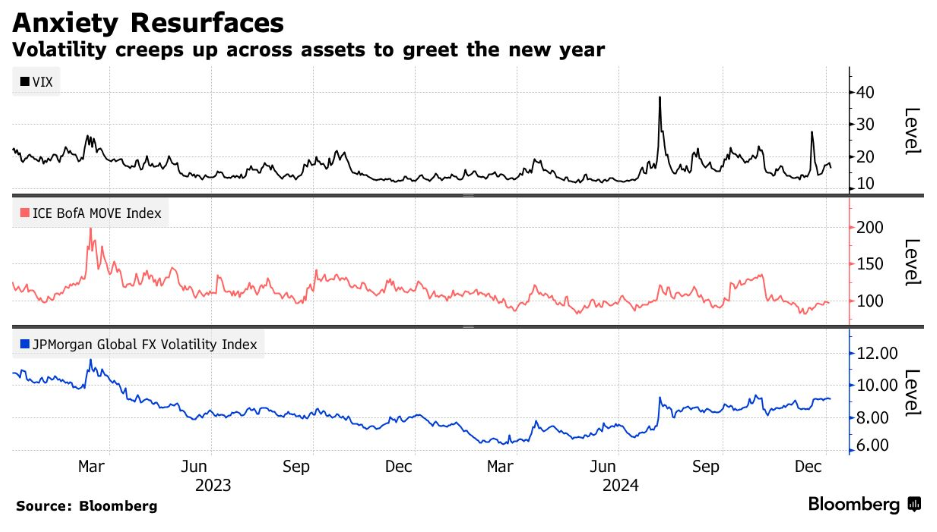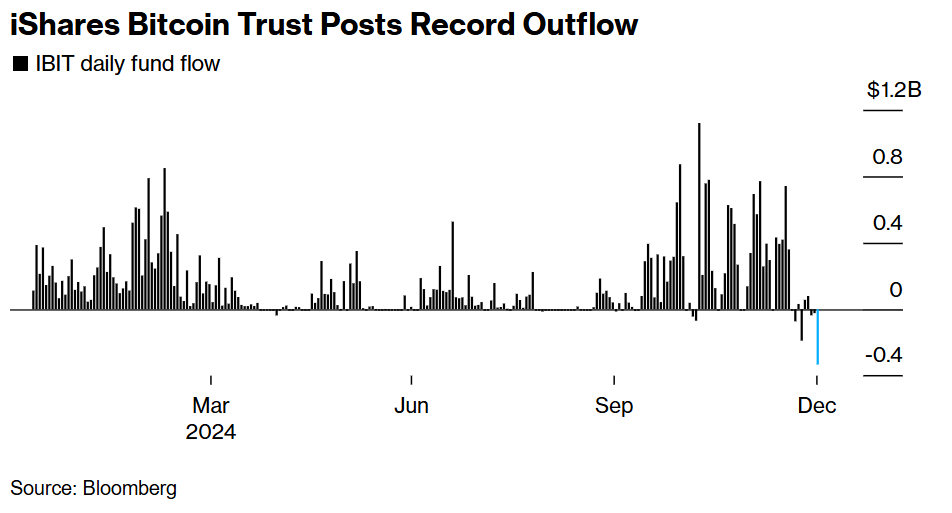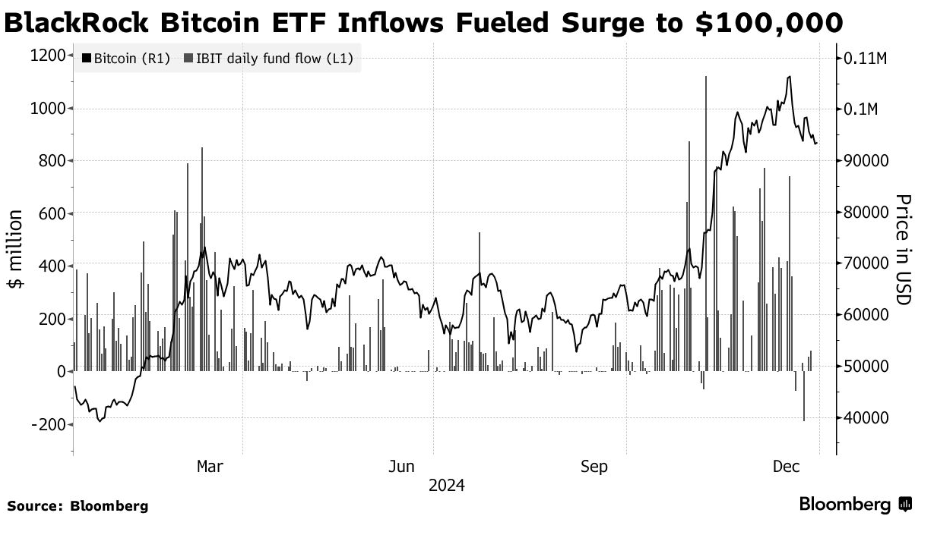Table of Contents
Even though Friday's trading session was a bright spot, traders in all asset classes have spent the post-holiday period taming the wild risk appetites that have dominated markets throughout 2024.
The markets did not show any signs of fear. Although the shifts were not dramatic, they did indicate caution, which was noticeably lacking in risk assets during the previous year.
Naysayers view any increased reluctance as beneficial, a check on the market's overheating after months of uncontrolled risk-taking on Wall Street.
However, the previous trend of the S&P 500 rising in the sessions immediately following Christmas was broken by the pullback in certain assets, notably equities, demonstrating the dangers of following predetermined playbooks in the second Trump administration.

On Friday, investors felt comfort following the US House speaker's quick re-election, and mega-cap tech stocks soared, leading to a 1.3% increase in the S&P 500.
Stocks fell for the week, remaining close to a low point after the Fed's latest policy meeting when policymakers signalled a smaller reduction in interest rates for the year than had been anticipated.
Protective measures are in high demand across all asset classes as investors prepare for policy uncertainty.
For the third week running, the Cboe Volatility Index — a measure of the pricing of S&P 500 options — has been on the rise.
An analogous metric for Treasuries, the ICE BofA Move Index reached a one-month peak as volatility increased in currencies and high-yield bonds.
Treasuries and corporate credit both saw an increase in volatility indicators. They put all their money into equities, which recorded the worst year-end decline.
The biggest exchange-traded fund (ETF) that follows Bitcoin, a cryptocurrency beloved by investors worldwide, experienced its largest-ever withdrawals.
On Thursday, investors withdrew $333 million from BlackRock's record-breaking iShares Bitcoin Trust ETF, the largest withdrawal from the fund since its introduction.
According to Bloomberg data, the fund has also had its longest losing streak to date, with outflows for three days in a row.

Midway through December, the largest digital asset hit a new record high of $108,315 thanks largely to the increasing interest from institutional investors in IBIT, the biggest spot Bitcoin fund with over $53 billion in assets and about $37 billion in inflows.
IBIT launched in January and has since garnered substantial popularity among these investors.
The decrease in flows to IBIT is another indicator that Bitcoin's chart-bursting run in 2024 is taking a break. Bloomberg reports that since December 19th, a group of 12 US-based Bitcoin exchange-traded funds had lost about $2 billion.
Open interest, or the number of contracts for Bitcoin futures hosted by Chicago-based CME Group Inc., also declined from its December high. This is considered an indicator of institutional demand in the US.
Still, none of the more than 1,400 exchange-traded funds offered by BlackRock's iShares business have achieved results comparable to the IBIT.
The iShares Bitcoin Trust broke all previous benchmarks in its first year of operation. Its assets increased from zero to $50 billion in only 11 months. To put it plainly, an ETF's debut has never been better. IBIT's size expanded to match the total assets under management of over 50 European market-oriented ETFs, many of which have existed for over 20 years.

BlackRock wasn't the only one who benefited from IBIT's success. It was a watershed moment for Bitcoin.
For the first time, Bitcoin's price surpassed $100,000 thanks to the backing of the world's largest investment corporation, BlackRock, which manages over $11 trillion in assets.
This welcomed both institutional investors and individuals who had previously been suspicious of the cryptocurrency. Securing a spot Bitcoin ETF in the United States encountered significant challenges.
The Winklevoss twins made a significant investment in 2013. When Bitcoin was valued near $100, they applied for an ETF. The application, similar to numerous preceding ones, was denied by the US SEC.
Grayscale Investments, a digital asset corporation, contested the SEC in court and declined to acquiesce to a negative response.
A federal appeals court overturned the regulator's decision to reject the request to convert a Bitcoin trust into an ETF in 2023, representing a notable triumph for the corporation.
BlackRock, the largest player in the financial industry, entered the room at approximately the same time. The company's CEO, Larry Fink, has previously criticized Bitcoin, saying that it facilitates international money laundering.
But his perspective changed, and he started to see Bitcoin as "digital gold," much like countless others in conventional finance before him.
That U-turn is much like Trump's towards the crypto industry.
Elsewhere
Blockcast
In this episode, host Takatoshi Shibayama speaks to Kain Warwick, founder of Infinex, and a renowned figure in the DeFi space, known for his work on the Synthetix protocol.
Warwick argues that the current crypto landscape, dominated by centralized exchanges, is unsustainable and hinders innovation. He outlines Infinex's vision to create a decentralized platform that rivals the convenience and accessibility of centralized exchanges while offering superior functionality and empowering users with true self-custody.
Previous episodes of Blockcast can be found on Podpage, with guests like Peter Hui (Moongate), Luca Prosperi (M^0), Charles Hoskinson (Cardano), Aneirin Flynn (Failsafe), and Yat Siu (Animoca Brands) on our most recent shows.
Events
Consensus (Hong Kong, 18-20 February)

Consensus is heading to Hong Kong, bringing together the industry’s most important voices from East and West for pivotal conversations and deal-making opportunities.
Consensus Hong Kong convenes global leaders in tech and finance to debate pressing issues, announce key developments and deals, and share their visions for the future.
Use promo code BLOCKDESK20 at checkout for a 20% discount on tickets here.
It's All Happening on LinkedIn
Did you know you can now receive Blockhead's juicy daily newsletters directly to your LinkedIn? Subscribe to our LinkedIn newsletters for the latest news and insights in the world of Web3. There also might be the occasional discount code for the industry's hottest events, exclusively for subscribers!





















